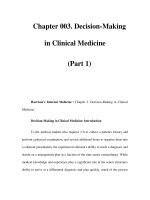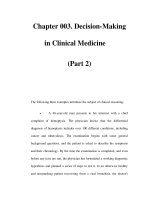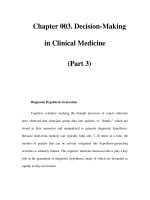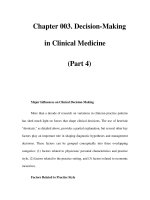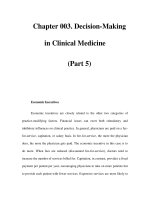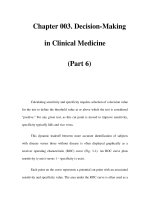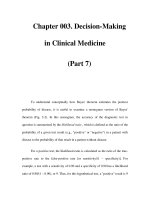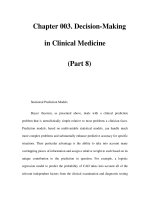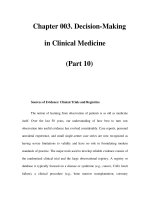Chapter 003. Decision-Making in Clinical Medicine (Part 9) doc
Bạn đang xem bản rút gọn của tài liệu. Xem và tải ngay bản đầy đủ của tài liệu tại đây (19.91 KB, 6 trang )
Chapter 003. Decision-Making
in Clinical Medicine
(Part 9)
Evidence-Based Medicine
The "art of medicine" is traditionally defined as a practice combining
medical knowledge (including scientific evidence), intuition, and judgment in the
care of patients (Chap. 1). Evidence-based medicine (EBM) updates this construct
by placing a much-greater emphasis on the processes by which the clinician gains
knowledge of the most up-to-date and relevant clinical research. The key
processes of EBM can be summarized in four steps:
1. Formulating the management question to be answered
2. Searching the literature and on-line databases for applicable
research data
3. Appraising the evidence gathered with regard to its validity
and relevance
4. Integrating this appraisal with knowledge about the unique
aspects of the patient (including preferences)
Steps 2 and 3 are the heart of EBM as it is currently used in practice. The
process of searching the world's research literature and appraising the quality and
relevance of studies thus identified can be quite time-consuming and requires
skills and training that most clinicians do not possess. Thus, the best starting point
for most EBM searches is the identification of recent systematic overviews of the
problem in question (Table 3-3).
Table 3-3 Selected Tools for Finding the Evidence in Evidence-
Based
Medicine
Name Descriptio
n
Web Address Availab
ility
Eviden
ce-Based
Medicine
Reviews
Comprehe
nsive electronic
database that
combines and
integrates:
1. The
Cochrane
Database of
Systematic
Reviews
2. ACP
Journal Club
3. The
Database of
Abstracts of
Reviews of
Effectiveness
Subscrip
tion required;
available
through
medical center
libraries and
other
institutions
Cochra Collection
Subscrip
ne Library
of EBM databases
including The
Cochrane
Database of
Systematic
Reviews—full
text articles
reviewing
specific health
care topics
tion required;
abstracts of
systematic
reviews
available free
online; some
countries have
funding to
provide free
access to all
residents
ACP
Journal Club
Collection
of summaries of
original studies
and systematic
reviews;
published
bimonthly; all
data since 1991
available on Web
Subscrip
tion required
site, updated
yearly
Clinica
l Evidence
Monthly
updated directory
of concise
ov
erviews of
common clinical
interventions
nicaleviden
ce.com
Subscrip
tion required;
free access for
UK and for
developing
countries
MEDL
INE
National
Library of
Medicine
database with
citations back to
1966
Free via
Internet
Note: ACP, American College of Physicians; EBM, evidence-based
medicine.
Generally, the EBM tools listed in Table 3-3 provide access to research
information in one of two forms. The first, primary research reports, is the original
peer-reviewed research work that is published in medical journals. Initial access to
this information in an EBM search may be gained through MEDLINE, which
provides access to a huge amount of data in abstract form. However, it is often
difficult, using MEDLINE, to locate reports that are on point in a sea of irrelevant
or unhelpful information and being reasonably certain that important reports have
not been overlooked. The second form, systematic reviews, comprehensively
summarizes the available evidence on a particular topic up to a certain date and
provides the interpretation of the reviewer. Explicit criteria are used to find all the
relevant scientific research and grade its quality. The prototype for this kind of
resource is the Cochrane Database of Systematic Reviews. One of the key
components of a systematic review is a meta-analysis. In the next two sections, we
will review some of the major types of clinical research reports available in the
literature and the process of aggregating those data into meta-analyses.

